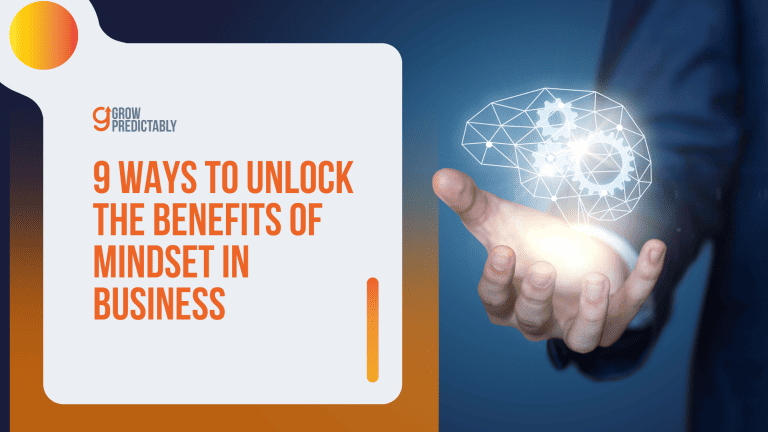Employee vs Entrepreneur Mindset: 10 Easy Ways To Avoid the Employee Mindset Trap
Employee vs entrepreneur mindset—how do they differ from each other? It might sound like a simple question, but it has a huge impact on your career goals and overall success.
In a general sense, your future depends on the way you think and approach challenges. How your way of thinking impacts your goals and progress also don’t completely rely on you being employed or you being a business owner.
While that may be a good starting point, it’s crucial to realize that there are business owners that think like an employee and employees that think like an entrepreneur.
In this post, we’ll outline the difference between an employee vs. entrepreneur mindset, how an entrepreneurial mindset can create value, and how you can shift to an entrepreneurial mindset.
What is an Employee Mindset?

As was mentioned earlier, being either an employee or a business owner doesn’t directly determine the quality of mindset that one possesses as a professional.
But when it comes to employees in general, there is a pattern of thinking that can be commonly observed.
The following are the kind of questions that people with an ’employee mindset’ usually examine themselves with. If you think like this, you probably have an ’employee’ type of mindset.
1. You focus too much on a specialization
‘Employee mindset’ workers tend to focus on just one aspect of the business and hone in on it with laser-like precision without taking into consideration all the other vital skills.
While this benefits the core responsibilities of an employee in an organization, opening the room for well-roundedness shouldn’t be thrown to the side.
Although employees do need to prioritize certain segments of their job, taking the time out for broader goal setting could improve the larger picture for everyone within the organization.
2. You live by guidelines 100% of the time
Employees tend to have stringent adherence to rules and guidelines, and it’s easy to understand why. By following what’s laid out for them, employees can ensure that their work is up to the highest standards.
Employees aim for recognition at work—just as anyone would appreciate receiving—and they believe sticking to the book is one way to do it.
That said, this current employee mindset of sticking to what’s been presented in guidelines and not taking creative license can be stifling. After all, who knows better how things should be done than the employees themselves?
They shouldn’t let the fear of disapproval stop them from thinking outside of the box – employees could just as easily get ahead in their careers by being an innovator as they would by sticking strictly to a rule book!
3. You only improve your skills when needed
Many employees dream to climb the ranks. So when it comes to employee mindset, many strive to learn more skills and develop their knowledge in order to get ahead in their career. However, it is often only for this purpose that they do so.
It’s no secret that upskilling is necessary for employees who want to climb up the corporate ladder; however, this can take a back seat once people with such a mindset see that there’s no opportunity to take a higher position.
This often leads to employees feeling complacent with their current knowledge and skill set, as they do not have a sense of urgency propelling them forward into gaining new knowledge.
Without the reward, employees break away from the pursuit of professional self-development.
Ultimately, when the opportunity arises and they need more knowledge or capability to move upwards, only then will most employees be motivated to take action and commit their time and energy to upskill themselves.
4. You don’t like taking risks
For the most part, employees tend to be risk-averse. Hence why the majority of employees dream of job security.
This could be attributed to employee culture as well as employees feeling that it can be safer to play it safe rather than take unnecessary risks.
This employee aversion to taking risks is reflective of the ways bosses and supervisors reinforce conservative choices and downplay any deviation from the norm.
Taking risks in the workplace can require quite a bit of employee trust, trust that it’s okay to break away from the usual practices for an improved end result.
Consequently, employees aim for more secure paths due to fear of punishment or lack of confidence more times than not, resulting in most employees staying within their comfort zone.
What is an Entrepreneurial Mindset?

Just like employees, entrepreneurs face challenges on the daily basis. However, the difference is how their reactions directly determine whether or not they make or break a successful business.
An entrepreneur’s actions directly impact the big picture. This is why, in general, entrepreneurs are wired differently when compared to how people with an employee mindset think on average.
Below are major examples of how entrepreneurs think.
1. You believe it’s crucial to be well-rounded
Being well-rounded is one of the keys to entrepreneurial success and to maintaining a successful business. An entrepreneurial mindset means having a combination of knowledge and skills that go beyond what is expected in your field.
A successful entrepreneur isn’t just creative or brilliant business strategist; they have a variety of interests, hobbies, and experiences that allow them to think outside the box and come up with innovative solutions for their own business.
By being knowledgeable in multiple areas, entrepreneurs can develop insight into how different aspects of society intersect with their business endeavors and gain access to untapped opportunities for progress.
2. You know that there’s always a different way
Entrepreneurs create many ways to do things. Entrepreneurs aim for ways to do better, faster, and smarter processes whenever possible because it’s what will often benefit them cost-wise as small business owners.
It’s a goal that every entrepreneur or entrepreneurial-minded professionals aim to achieve.
From developing a product with outstanding features to increasing customer satisfaction to implementing innovative strategies that can cut costs and improve efficiency, entrepreneurs have a knack for knowing what moves things forward.
Entrepreneurs focus on how their work impacts the world and refuse to rest until everything is done right. In short, entrepreneurs aim high and think outside the box as creative individuals.
3. You love growing knowledge-wise
Entrepreneurs never stop learning as they go along their entrepreneurial journey.
Whether it be through trial and error, the ability to recognize warning signs, or the desire to expand their knowledge, entrepreneurs create success while constantly aiming for excellence.
Despite some entrepreneurs not earning any tangible “reward” to show for their hard work and dedication, they take pride in every lesson they learn and use them in their next endeavor.
The drive entrepreneurs have to always keep growing means that no educational experience gained is ever wasted – even with no reward.
4. You don’t shy away from taking risks
Whenever entrepreneurs start their business, they accept a certain amount of risk that comes with their venture—it’s the entrepreneur spirit!
The way entrepreneurs approach risk often depends on their level of knowledge and experience in whatever industry the project lies in.
Some entrepreneurs prefer to make more calculated gambles, seeking out data related to the potential outcomes before reaching a decision.
Others adopt what almost feels like an entrepreneurial sixth sense for taking risks, deciding based on “gut” feelings – whatever feels right to them at that moment.
In either case, an entrepreneur can benefit from performing careful risk calculations as part of their usual due diligence to ensure they’re well-equipped in making crucial decisions along their journey as a small business owner or serial entrepreneur.

Even Employees Can Embody an Entrepreneurial Mindset
It can be easy for employees to become complacent in the daily nine-to-five grind. However, employees don’t have to give up on their entrepreneurial dreams simply because of a comfortable day job.
Instead, employees should continue to strive towards their goals while connecting the dots between their current position and their ultimate aim.
For example, employees can proactively look for ways to solve workplace problems or gain skills that will help them eventually run their own businesses.
Fostering an attitude of curiosity and self-improvement is essential if employees are going to embody an entrepreneurial mindset even within a structured office environment.
Employee vs Entrepreneur Mindset: How to Cultivate an Entrepreneurial Mindset
Let’s say you have a regular nine-to-five and you’re gearing toward being a full-time entrepreneur but you’re worried about not being in the right headspace before you take the big jump.
It’s fine, you can always make the shift. Everyone can be leaders, risk-takers, and change-makers with the right mindset.
With an entrepreneurial way of thinking, you’ll find that it won’t only positively impact your quality of work, but it may also benefit your environment at work. To cultivate an entrepreneur’s mindset, begin with the following:
1. Take on different tasks and responsibilities: Taking on more tasks uses up your time and resources. But, it can also stretch out your abilities and help you learn new things that can benefit you once you go into entrepreneurship full-time. This is how entrepreneurs look at responsibilities—with a growth mindset.
2. Have the initiative to solve workplace problems: There’s always more than one way to do things. Don’t settle with what’s already tested and proven. While there’s nothing wrong with that, you’ll never know if there’s a better way until you explore other options. Try to view things with a wider lens!
3. Seek out mentors that can provide guidance: If there’s one thing that entrepreneurial-minded people never put aside it’s constant learning. Entrepreneurs often wear many hats, and to do things effectively they need to learn many things. Getting mentored is one way to do it.
4. Set clear and achievable goals: Setting achievable goals is different from simply setting just whatever goal that you think you need to achieve. Sometimes, what we set isn’t realistic for our business. To avoid doing that, set specific, measurable, achievable, relevant, and time-bounded goals (SMART goals).
5. Challenge the status quo and think outside of the box: Following the status quo isn’t a negative thing at all. It creates security and predictability. But what if there’s more to be done? One can’t be an entrepreneur without the courage to challenge things and discover new possibilities.
6. Embrace risk-taking in order to find creative solutions: There’s a careless way of taking risks and there’s also a calculated way of taking risks. The latter is what entrepreneurs are often good at doing. To find creative solutions, sometimes you need to calculate things and then take big jumps.
7. Don’t just work hard; work smart!: Working hard will get you closer to the results that you want. But working hard and smart will get you there faster. Efficiency should always be at the core of things. Ask yourself: is there a better, faster, and more cost-effective way of getting the results that I want?
8. Practice accountability in everything that you’re involved with: When things go wrong, some people default to finding someone to blame. But this does nothing good. Instead, practice accountability by paying attention and showing care even to the most minor details.
9. Be always open to change and development: The only thing that’s constant in our world is change. So, be open to change when it’s needed. When you let go of what you believe is time-tested and give chance to the “new things,” you open your doors to better possibilities in business and entrepreneurship.
10. Learn how to constantly push yourself out of your comfort zone: The comfort zone is a safe place. But in order to have an entrepreneurial mindset, don’t allow yourself to be infatuated with what feels comfortable. Remember, entrepreneurs brave possibilities, and no great venture is conquered in business by just staying inside your safe space all the time.
FAQs
So many professionals self-examine their approach to work in order to spot the areas that they need to work on and bring about betterment to how they handle things.
When they do, they ask questions that are common to many like them. So let’s answer some of these questions below.
In Summary
An employee mindset and an entrepreneurial mindset are two different approaches to work. An employee focuses on stability, security, and a regular paycheck, while an entrepreneur is driven by impact, innovation, and professional growth.
Employees can also embody an entrepreneurial mindset by thinking outside the box and taking risks. If you want to shift to an entrepreneurial mindset, start by changing your perspective and embracing new challenges.
Finally, don’t forget to ask yourself some key questions that will help guide your transformation.








